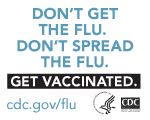CDC In the News
FY 2008 CDC Congressional Budget Hearing
Published: March 12, 2007
Updated: March 16, 2007

Dr. Gerberding
On Friday, March 9th, Centers for Disease Control and Prevention (CDC) Director Dr. Julie Gerberding presented the agency's fiscal year (FY) 2008 budget request during a Congressional Hearing held by the House Appropriations Subcommittee on Labor, HHS, Education, and Related Agencies. The CDC hearing was combined with a second panel during which Dr. Gerberding, Dr. Anthony Fauci (NIH), and Dr. Gerald Parker (HHS) presented the HHS FY 2008 budget request for Emergency Preparedness. Brief opening comments by each were followed by questions from committee members.
For FY 2008, CDC'sbudget request includes a total funding level of $8.8 billion. During her opening remarks, Dr. Gerberding stressed the need for a balanced portfolio of health protection activities that recognizes urgent threats (i.e. pandemic influenza, terrorism), as well as urgent realities such as obesity, chronic diseases, cancer and disabilities. She also expressed the need for transparency and accountability in CDC activities.
Related Information
- Selected video clips from Dr. Gerberding's testimony (new!)
- Dr. Gerberding's written statement submitted to the Subcommittee (PDF, 76 KB)
- Dr. Gerberding's presentation (PDF, 1.23 MB)
Despite a busy day of Appropriations hearings, all but 2 of the 18 members of the Subcommittee were in attendance. Although the combined hearing also included oral statements by Dr. Fauci and Dr. Parker concerning department-wide emergency preparedness activities, the vast majority of the questions were directed toward Dr. Gerberding regarding CDC. For over two hours, members asked Dr. Gerberding a range of questions on various topics ranging from preventing obesity to improving the nation's food safety. The Subcommittee members showed strong support for CDC, and asked how they can be more helpful to further the mission of the agency. Below is a summary of the issues raised by each member:
- James Walsh (R-NY): Rep. Walsh expressed concern that chronic disease and prevention programs have been cut or flat-lined for the last several years, which is problematic given the need to address urgent realities such as obesity, aging, and chronic diseases.
- Jessie Jackson (D-IL): Rep. Jackson asked about Inflammatory Bowel Disease, REACH (Racial and Ethic Approaches to Community Health), as well as about the new $93 million HIV/AIDS Testing Initiative.
- Ralph Regula (R-OH): Rep. Regula asked about the reduction of West Nile virus funds in FY08. Regula also asked about progress in getting the public health system coordinated (i.e. effectiveness of Biosense). Regula also asked about sleep disorders and hereditary blood disorders.
- Rosa DeLauro (D-CT): Rep. DeLauro stressed the need to address food safety and food-borne illness, with added emphasis on getting at the root cause of the problem. DeLauro also expressed discontent that chronic disease and prevention funding continues to lag behind that of emergency preparedness.
- Jerry Lewis (Ex Officio): Rep. Lewis asked about the President's Malaria Initiative.
- Lucille Roybal-Allard (D-CA): Rep. Roybal-Allard asked Dr. Gerberding about the difficulties the agency faces with the current hiring processes at CDC (delays, onerous review process), and requested that Dr. Gerberding provide an action plan for addressing the hiring issues. Roybal-Allard also asked about the laboratory surge capacity in the event of a disaster (i.e. newborn screening during Hurricane Katrina). And, asked Dr. Gerberding to provide a professional budget estimate on CDC's needs.
- Dave Weldon (R-FL): Rep. Weldon wanted to know more about the HIV Rapid Testing Initiative (especially surrounding targeting high-risk groups). Weldon also asked about the Vaccine Safety Datalink, and its effectiveness at tracking issues related to mercury/thimerosol.
- Nita Lowey (D-NY): Rep. Lowey expressed concern about childhood and adolescent obesity, and wanted to know how CDC was coordinating with the Department of Education in this area.
- Mike Simpson (R-ID): Rep. Simpson asked about the 12 states receiving Oral Health Grants.
- Barbara Lee (D-CA): Rep. Lee asked for an update on the HIV testing recommendations released by CDC in the fall. Lee was particularly interested in the provision of counseling and emphasized the need for counseling that reflects the needs of the target audience (e.g., high-risk groups, African Americans).
- John Peterson (R-PA): Rep. Peterson expressed interest in the Physical Education for Life programs, and how CDC is working to promote behavior change and physical activity.
- Tim Ryan (D-OH): Rep. Ryan asked about the Steps to a Healthier US Cooperative Agreement Program (Steps Program) funding cut, and also emphasized the need for CDC to coordinate activities with programs at the Health Resources and Services Administration (HRSA).
- Betty McCollum (D-MN): Rep. McCollum expressed concern about drug-resistant tuberculosis (XDR-TB), and wanted information related to the US government response to address this disease.
- Tom Udall (D-NM): Rep. Udall expressed concern that chronic disease and prevention programs have been cut or flat-lined for the last several years, which is problematic given the need to address urgent realities such as obesity, aging, and chronic diseases.
- David Obey (D-WI): Rep. Obey asked Dr. Gerberding to provide a professional budget estimate (without interference from OMB) for CDC FY 2008 needs. Obey asked about reports of morale issues at CDC. Obey asked Dr. Gerberding about the use of contractors at CDC. He also asked about hospital surge capacity and how well-prepared the government is to address a serious emergency event.
Overall, the CDC budget hearing was successful for discussing the work of the agency. From the variety of questions Dr. Gerberding received, she was able to highlight the wide range of work the agency is involved with and describe numerous success stories. In closing, Dr. Gerberding stressed the outstanding leadership team the agency has in place and reiterated the need to focus on staff concerns such as the hiring backlog, resources necessary to get the work done, and complications with existing business systems. With support from many members across party lines, Dr. Gerberding was able to highlight the need for increased support across the agency and stress the need for a balanced portfolio so the agency has the resources it needs to fulfill the breadth and depth of its public health mission.
Once available, the official hearing transcript will be posted. CDC will also receive questions for the record (QFRs) from the Subcommittee. These questions are another opportunity for the agency to highlight its successes.
Page last modified: April 19, 2007

